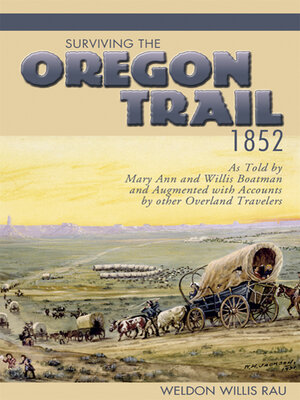Surviving the Oregon Trail, 1852
ebook ∣ As Told by Mary Ann and Willis Boatman and Augmented with Accounts by other Overland Travelers
By Weldon Willis Rau

Sign up to save your library
With an OverDrive account, you can save your favorite libraries for at-a-glance information about availability. Find out more about OverDrive accounts.
Find this title in Libby, the library reading app by OverDrive.



Search for a digital library with this title
Title found at these libraries:
| Library Name | Distance |
|---|---|
| Loading... |
With numbers swelled by Oregon-bound settlers as well as hordes of gold-seekers destined for California, the 1852 overland migration was the largest on record in a year taking a terrible toll in lives mainly due to deadly cholera. Included here are firsthand accounts of this fateful year, including the words and thoughts of a young married couple, Mary Ann and Willis Boatman, released for the first time in book-length form.
In its immediacy, Surviving the Oregon Trail, 1852 opens a window to the travails of the overland journeyers—their stark camps, treacherous river fordings, and dishonest countrymen; the shimmering plains and mountain vastnesses; trepidation at crossing ancient Indian lands; and the dark angel of death hovering over the wagon columns. But also found here are acts of valor, compassion, and kindness, and the hope for a new life in a new land at the end of the trail.







